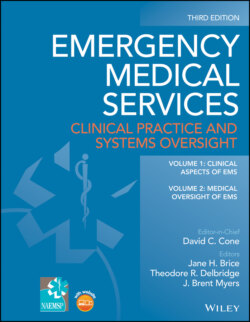Читать книгу Emergency Medical Services - Группа авторов - Страница 437
Immunocompromised
ОглавлениеMany patients are considered relatively immunocompromised due to their underlying medical conditions. Examples include the elderly, cancer patients undergoing treatment, malnourished patients, diabetics, patients with end‐stage renal disease, patients on certain medications (e.g., chronic steroids and many medications for diseases such as rheumatoid arthritis and irritable bowel disease), and those with HIV infection but adequate CD4 counts. As a result of their underlying conditions, these patients have depressed inflammatory responses and tend to present later in their illness courses.
Of greater concern are patients who are more profoundly immunocompromised, many times based on treatments they receive for their underlying conditions. Examples include AIDS patients with low CD4 counts, transplant patients on chronic immunosuppressive medications, leukopenic cancer patients on chemotherapy, and patients with other conditions requiring immune modulating medications such as inflammatory bowel disease or rheumatoid arthritis. These patients present with an expanded list of serious conditions that may manifest as abdominal complaints, including neutropenic enterocolitis, graft‐versus‐host disease, cytomegalovirus‐related perforation, and tuberculous peritonitis [43]. Important questions to ask include history of fevers, vomiting and/or diarrhea, recent changes in medication regimen (including noncompliance due to financial or other logistical barriers), and any prior similar episodes. Transplant patients should have the date and location of their surgery noted. EMS protocols or direct medical oversight should provide the option for such patients to be transported to specialty centers capable of managing their potentially complex conditions when feasible. Because immunocompromised patients present late in their courses, their mortality tends to be high.
